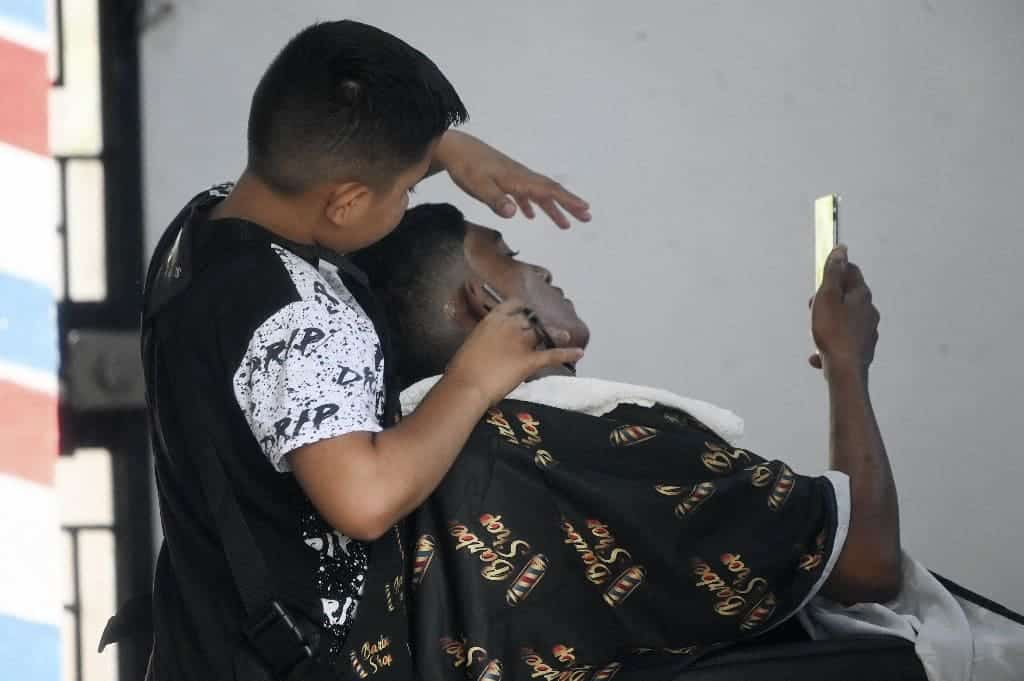Two of his brothers and several of his friends emigrated to the United States in search of better opportunities, but 12-year-old Eduardo Espinal is betting on a future in Honduras, where he opened a barbershop last month to help his family.
“I like barbering a lot and studying too,” he tells AFP sitting on the patio in front of his “Eduar Barber Shop” in Comayagua, some 80 km north of Tegucigalpa.
Eduardo was born into a family of limited resources. His father, Wilfredo Espinal, 50, earns his living by digging sand out of a river to sell to builders, and his mother is a housewife.
He wanted to help his family, and at age 11 he began working at a barbershop he frequented with his father, where he learned the trade.
School versus work
“My daddy bought me my first machine, from there I started cutting his hair,” says this boy who finished elementary school in 2021 and plans to start high school next year.
Child labor is a reality in Honduras and in many other Latin American countries, although laws prohibit it. In Honduras, only those over the age of 14 can legally work.
In 2021, some 256,000 children and young people aged 5 to 18 were working in Honduras, Horacio Lovo, deputy director of the National Statistics Institute (INE), told AFP. And half a million of the 2.3 million Honduran children and young people between the ages of 5 and 18 are neither studying nor working, he added.
“The desirable thing is for children to be in school (…) The serious case is those who abandon their studies because they work,” said Lovo.
Eduardo worked for a year as an apprentice, until a little over a month ago he said: “Daddy, I can cut, I want you to buy me a chair,” his father told AFP.
In addition to the hair clipper, scissors, razor and barber’s overalls, Wilfredo Espinal bought his son a barber’s chair that cost him 22,000 lempiras (about US$900), and helped him set up the humble barbershop in a small house with adobe walls lined with cement and a zinc roof on the outskirts of the city.
Eduardo charges between two and three dollars a cut, depending on the style. His best day was when he served 16 people who left him about $45. A good income in a country where a third of the population of nearly 10 million lives on less than a dollar a day.
Time to play
Although the barbershop opens at 08H00 and closes at 20H00, he also finds time to play. On a normal day, “I get up, bathe, change, eat and come (…) I play when I don’t have clients, at about five [in the afternoon] we go play hide-and-seek [and] with the bike” or soccer, he explains.
He says he wants “to be a professional barber”. He also dreams of helping his sister, Darliana, 8, open a beauty salon, and would like to build a house for his mother, Merlin Carranza, 38.
César Zepeda, a 57-year-old welder who was satisfied with the cut his young barber gave him, believes Eduardo and his parents are an example. Children should be “supported in what they like the most,” he said.
“It is not necessary to leave for another country in order to succeed,” he said.
Low incomes, lack of job opportunities and violence by gang members and drug traffickers in Honduras force about 800 Hondurans to emigrate every day to the United States, where more than one million Hondurans live, most of them without residency or work permits.
Jorge Ramos, the barber who taught him the trade, also tried to emigrate, but was deported.






